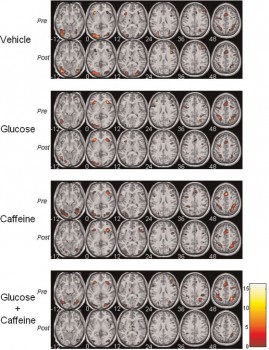 The combination of caffeine and glucose can improve the efficiency of brain activity, according to a recent study in which functional magnetic resonance imaging was used to identify the neural substrate for the combined effects of these two substances. The results of the study was published in the journal Human Psychopharmacology: Clinical and Experimental.
The combination of caffeine and glucose can improve the efficiency of brain activity, according to a recent study in which functional magnetic resonance imaging was used to identify the neural substrate for the combined effects of these two substances. The results of the study was published in the journal Human Psychopharmacology: Clinical and Experimental.
The study is led by the researchers Josep M. Serra Grabulosa, from the Department of Psychiatry and Clinical Psychobiology at Universidad de Barcelona (UB) and a member of the August Pi i Sunyer Biomedical Research Institute (IDIBAPS); Ana Adan, a lecturer from the same department and a member of the UB’s Institute of Brain, Cognition and Behaviour (IR3C); and Carles Falcón, a member of the Biomedical Research Networking Center in Bioengineering, Biomaterials and Nanomedicine (CIBER-BBN).
“Our main finding is that the combination of the two substances improves cognitive performance in terms of sustained attention and working memory by increasing the efficiency of the areas of the brain responsible for these two functions”, explains Josep M. Serra Grabulosa. This supports the idea of a synergistic effect between two substances, in which each one boosts the effect of the other.
Specifically, the team found that individuals who consumed caffeine and glucose in combination showed reduced brain activation associated with the task in the bilateral parietal cortex and the left prefrontal cortex – two regions that actively participate in attention and working memory processes. The reduced activity and the fact that no drop in behavioural performance was observed during the task suggests that the brain is more efficient under the combined effect of the two substances, since it needs fewer resources to produce the same level of performance than required by those subjects who were administered the placebo or who took only caffeine or glucose.
For the study, the team of researchers from the UB used functional MRI to analyze brain activity during the n-back task, which evaluates sustained attention and working memory – basic capacities in improving everyday cognitive tasks. In a double-blind randomized design, participants were tested after drinking a study beverage containing either caffeine, glucose or the two combined or a placebo consisting only of water. Tests were conducted with a sample of 40 healthy volunteers at the Diagnostic Imaging Centre of the Hospital Clínic de Barcelona.
An earlier study by the same research team on the effects of caffeine and glucose consumption revealed improvements in attention span and declarative memory without significant alteration of the participants’ subjective state. The conclusions suggested that a combination of caffeine and glucose has beneficial effects on attention (sequential reaction time tasks) and learning and on the consolidation of verbal memory, none of which were observed when the substances were consumed separately.
Material adapted from Universidad de Barcelona.
Reference
Josep M Serra Grabulosa, Ana Adan, Carles Falcón, Núria Bargalló. “Glucose and caffeine effects on sustained attention: an exploratory fMRI study”. Human Psychopharmacology: Clinical and Experimental. DOI: 10.1002/hup.1150 (2010).

Although the researchers indeed found improved cognitive performance upon intake of caffeine and sugar, I do not think folks should run out and purchase a cupboard full of energy drinks or drink gallons of coffee. The side effects of increased caffeine include activation of the sympathetic nervous system, such tension, irritability, nervousness, and anxiety, while excessive glucose can produce mood swings and weight gain (and is particularly troublesome for those who are overweight and/or diabetic).
For some, caffeine (100 mg – not a cure) does work better than Ritalin (not a cure) for ADHD. The fact that caffeine (100 mg) plus sugar (dextrose, glucose) can temporarily improve aspects of paying attention has been known for over 40 years.